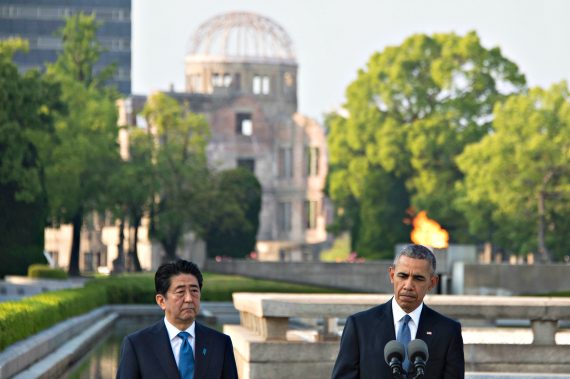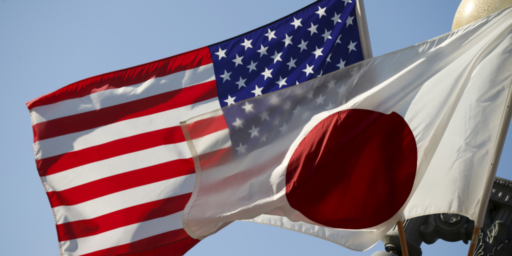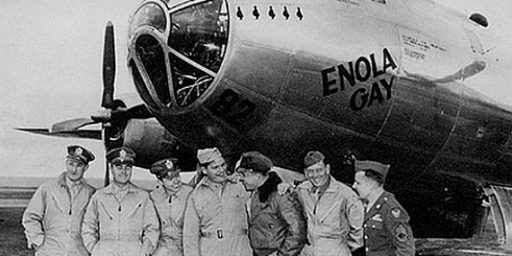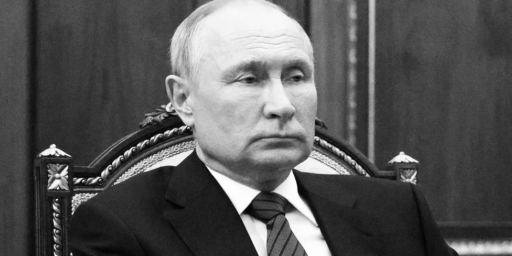Obama’s Visit To Hiroshima Brings Reflection, But No Apologies
President Obama's visit to Hiroshima left just the impression it should have.
President Obama became the first sitting American President to visit the memorial at Hiroshima, Japan, the site of the first use of an atomic weapon in war, and while he did talk of the ambition of a world without nuclear weapons and the lessons we can draw from what happened there, he was careful not to apologize for the bombing:
HIROSHIMA, Japan — President Obama laid a wreath at the Hiroshima Peace Memorial on Friday, telling an audience that included survivors of America’s atomic bombing in 1945 that technology as devastating as nuclear arms demands a “moral revolution.”
Thousands of Japanese lined the route of the presidential motorcade to the memorial in the hopes of glimpsing Mr. Obama, the first sitting American president to visit the most potent symbol of the dawning of the nuclear age. Many watched the ceremony on their cellphones.
“Seventy-one years ago, on a bright cloudless morning, death fell from the sky and the world was changed,” Mr. Obama said in opening his speech at the memorial.
“Technological progress without an equivalent progress in human institutions can doom us,” Mr. Obama said, adding that such technology “requires a moral revolution as well.”
In an emotional moment afterward, Mr. Obama embraced and shook hands with survivors of the attack, which exposed humanity to risks the president has repeatedly said the world must do far more to resolve.
The first of those survivors, Sunao Tsuboi, a chairman of the Hiroshima branch of the Japan Confederation of A- and H-bomb Sufferers Organizations, gripped Mr. Obama’s hand and did not let go until he had spoken to him for some time.
“I held his hand, and we didn’t need an interpreter,” Mr. Tsuboi, 91, said later. “I could understand what he wanted to say by his expression.”
In another poignant moment, Mr. Obama exchanged an embrace with Shigeaki Mori, 79, who was 8 years old when the bomb fell. Mr. Mori spent decades researching the fates of American prisoners of war who were killed in the bombing.
For weeks, the White House had refused to say whether Mr. Obama, would meet survivors. It was a delicate decision. Many survivors long for an apology for an event that destroyed just about everyone and everything they knew, and there were small demonstrations near the ceremony on Friday by protesters demanding an apology. But Mr. Obama said before his trip that he would not apologize for the attack.
Still, Mr. Obama’s homage to the victims and his speech were welcomed by many Japanese. “I am simply grateful for his visit,” said Tomoko Miyoshi, 50, who lost 10 relatives in the Hiroshima attack and wept as she watched Mr. Obama on her cellphone.
In his speech, Mr. Obama, using the slow and deliberate cadence that he uses on only the most formal and consequential occasions, said that the bombing of Hiroshima demonstrated that “mankind possessed the means to destroy itself.”
But he said that in the 71 years since the bombing, world institutions had grown up to help prevent a recurrence. Still, nations like the United States continue to possess thousands of nuclear weapons. And that is something that must change, he said.
In a striking example of the gap between Mr. Obama’s vision of a nuclear weapons-free world and the realities of purging them, a new Pentagon census of the American nuclear arsenal shows his administration has reduced the stockpile less than any other post-Cold War presidency.
“We must have the courage to escape the logic of fear and pursue a world without them,” he said, although he quickly added: “We may not realize this goal in my lifetime, but persistent effort can roll back the possibility of catastrophe.”
Still, he said, more was needed. Noting that far more primitive weapons than nuclear arms are causing widespread destruction today, Mr. Obama called for humanity to change its mind-set about war.
“The world was forever changed here, but today the children of this city will go through their day in peace,” Mr. Obama said. “What a precious thing that is. It is worth protecting, and then extending to every child. That is a future we can choose, a future in which Hiroshima and Nagasaki are known not as the dawn of atomic warfare but as the start of our own moral awakening.”
Here’s the video of President Obama’s remarks, along with the prepared text:
In advance of the President’s visit, it was made clear that the President would not be offering an apology for the bombing, nor would their be any suggestion that the decision made by President Truman should be reexamined based on the distance of seven decades. For several reasons, that strikes me as both a reasonable and correct decision for both practical and historical reasons. Practically speaking, such an apology would have resulted in real political repercussions both back home in the United States. Domestically, the World War II generation may be shrinking but it is still an important constituency and our involvement in the war a subject that continues to arouse real passions even among Americans who were not alive at the time. After all, from the American point of view the United States might never have gotten involved in a war in the Pacific if Japan had not engaged in a sneak attack on Pearl Harbor that resulted in thousands of deaths and stands along with the September 11th attacks as the only time in recent memory when the American homeland was attacked in a act of war. Everything that followed after that is largely seen by most Americans as a necessary consequence of what Japan did in December 1941. Additionally, the fact that the Japanese have never really apologized for the attack on Pearl Habor, or for the brutal treatment of American prisoners of war would have made an apology a big political mistake on Obama’s part. Internationally, an apology for one of the acts that helped bring the war in the Pacific Theater to an end would have caused problems for America’s relationship with South Korea and China, both of whom suffered long and brutally under the rule of Imperial Japan, events for which the Japanese have also not completely apologized for much to the frustration of most of its neighbors. At a time when the United States is relying on these nations, and on Japan, to stand against North Korea in a united front, an apology would have only needlessly complicated an already complicated situation.
Additionally, there is plenty to support the argument that no apology is necessary for the atomic bombings of Hiroshima and Nagasaki. At the time he made the decision to approve the bombings Truman was being told by advisers that Japan was refusing to comply with demands for unconditional surrender notwithstanding the fact that the United States had largely completed the encirclement of the Japanese homeland and was clearly preparing for a land invasion. Even events such as the bombing campaign against Tokyo, which resulted in nearly as many casualties as the bombing of Hiroshima, failed to persuade the nation’s military leaders to give up a war that was clearly lost. Had the atomic bombs not been used, then the likely next step would have been a multi-step invasion of the Japanese home islands that would have resulted in millions of Japanese military and civilian deaths as well as significant casualties on the allied side. Given that option, the decision to utilize atomic weapons for the first time in the hope that this would hasten the end of the war was arguably the far more moral decision that Truman could have made. In the 70 years that have followed, historians have pushed back against these contentions at various times and argued that other options existed to force a Japanese surrender, but these are pronouncements made with the hindsight of history. Based on the information that was available to him at the time, it seems obvious that President Truman made the right decision. Yes, he let the nuclear genie out of the bottle, but that was likely to happen at some point anyway and the fact that the world got this demonstration of the destructive force of nuclear weapons has arguably helped contribute to the desire to prevent their being used in the future and limit the spread of nuclear weapons technology. To that extent, Truman likely did the world a favor.
Beyond the lack of an apology, President Obama’s remarks today strike me as largely appropriate under the circumstances. Enough time has passed that it was appropriate for an American President to come to Hiroshima and address what happened there, and he did so in a manner that both recognizes the importance of the event in world history and the context in which it occurred. There has been some push back against his talk about a world free of nuclear weapons, but it’s worth noting that this is a goal that President Reagan also had, and one that other Presidents have mentioned a well. No doubt, President Obama recognizes that this is rhetoric at best and a goal that, assuming it can and should be achieved, is a long way off. In the meantime, it was good that an American President could visit Hiroshima while some survivors are still alive. Perhaps the Prime Minister of Japan should consider scheduling similar visits to Pearl Harbor, Nanking, and other parts of the world where Imperial Japan’s brutality was inflicted on the world.







But but but … of course he apologized! It says so right here! You simply can not argue w/ intellectual giants like Jim Hoft, John Bolton, Joel Pollak & the usual gang of idiots.
Man, really gonna miss this President. He wasn’t perfect, but he was actuallyPresidential.
It’s interesting to contrast this speech with the statement he issued about the attack on Pearl Harbor in 2011.
The two events bookended our war with Japan, but the tone of the two pieces are quite dissimilar.
I’m mixed thoughts on this is. On one hand, I think the US decision to use the atomic weapon was immoral and it’s something we actually should be sorry for having done.
On the other hand, there is an organized movement by Japanese nationalists (similar to the neo-confederates you see in the US) to rewrite the history of the war as a purely defensive struggle where Japan was the victim of US/Chinese/Korean imperialism. As long as Hiroshima is a central part of that, it’s really hard to back an explicit apology.
So it seems Obama did a good job threading the needle here.
@Stormy Dragon: Additionally China is trying to rewrite this same history to minimize the effect the atomic bombs had in ending the war in the pacific. I also think that Abe does himself no favors by visiting the yasukuni shrine. Fierce Nationalism is a terrible look worldwide, it tends to distort reality and create insane justifications.
@Dave D:
Funny, that, isn’t it Dave? I mean, just take a look at the U.S. circa 2001 to, let’s say . . . the present. Never mind the past 7.5 years of it.
@Stormy Dragon: there was little choice in that matter, the japs were not going to surrender and we were poised to lose thousands more people in the process. research the lead up battles and you can see they were not going to back down and were determined to take as many lives as they could- even though they knew they were beat. they used suicide bombers before muslims made it trendy
the short story speech could have been something like this- “payback’s a bitch”.
It’s not just revisionism and hindsight, Doug. A lot of military leadership from WWII disagrees with your contentions about how necessary the bombing was. Eisenhower, McArthur, Stimson, George Marshall, Admiral Leahy, etc, are all on the record stating that Japan was already defeated and preparing to surrender, and that dropping the bomb was not tactically necessary.
That being said, I agree that apologizing now would be counter-productive and have serious political consequences. I think that Obama struck the perfect balance today.
President Obama at his Presidential best. America is going to miss that man. He hit just the right note, as he has been doing during this entire Asian trip.
@dennis: I was in no way exonerating America of it, just noting that it does no good. Sorry if it came off in any way shape or form that wasn’t just a denouncement of Nationalism, which is the problem at hand.
@Ben in RI: I can intellectually disagree with dropping the bomb, which I do, in hindsight. But if Japan was so poised to surrender why did they refuse to surrender after the first atomic bombing?
It’s politically incorrect, but Japan was so much in the grip of a military death cult that they wouldn’t have surrendered absent the bombs. Heck, even after Nagasaki, some military officers tried to stage a coup in an effort to stop the surrender.
Note too that decades after the surrender, Japanese soldiers were still coming out of the jungle. I think that it is likely Truman made the right decision. I also think that it is not so clear cut that the US didn’t have some responsibility for goading Japan into war, but that’s for another post.
It was hard but in the end it was right. We were already burning Japanese cities to the ground, the A-bomb just meant we could do it with one plane instead of hundreds. And because we panicked Hirohito, and most likely because he realized he might be next, the Japanese folded.
You know how many Frenchmen died as a result of D-Day from Allied artillery and air attacks? IIRC it was something like 20,000. That’s 20,000 friendly civilians, the people we were theoretically saving. And Normandy was small beer compared to what we’d have had to do on mainland Japan with civilians we saw as hostile. The idea that Japan was ready to fold is nonsense. As mentioned by several upstream, even after Hiroshima the military wanted to hold out. Even had they surrendered they could have carried on guerrilla warfare in Japan for decades.
We’d have killed millions of Japanese civilians. People should understand that the three alternatives were: Naval blockade – essentially pull a Leningrad on Japan by starving them, and the first to die are not soldiers but the old and sick, and then the children. Invasion – which would have killed millions of Japanese civilians and soldiers and quite likely brought starvation and disease in their wake. And air power – either firebombing or the atomic bomb.
And we’d have lost more of our men, more Russians who’d have gotten in, carrying the war on in their usual charming fashion, more Brits and Indian colonial troops, more Aussies and Kiwis, Frenchmen and French colonial forces. In the end a generation of Japanese youth would have died, making their recovery infinitely harder and far less likely. Japan would have been split into occupation zones and the Soviets would have been in for a big piece.
Does anyone really think that a Japan that spent a year being shattered by American artillery and naval gunfire and bombers, a Japan where hardened Soviet troops who’d just raped their way to Berlin would occupy large portions of the country, would be better off? The logic of the scenario is clear.
War is all bad alternatives, there’s no good answer. One way or the other a hell of a lot of Japanese were going to die, that was baked in the cake by that point. The question was more or fewer dead Japanese, more or fewer dead allies, more or fewer dead Americans, more or less capacity for recovery.
Japan was not Vietnam or Iraq, this was no war of choice. In the end, if you don’t want your cities burned down, don’t make war on the United States of America.
@Jenos Idanian:
I’d say Hiroshima transcends the events of WWII, as important as it was to swiftly ending the worst decade in recorded human history. Pearl Harbor signaled the beginning of American military action. Dropping the bombs signaled the beginning of something altogether worse. Obama’s words this week were speaking to a greater evil.
I have to agree with Mr Reynolds (glad you’re back), and echo Mr Dragon’s concern about the Japanese nationalists. Anyone who hasn’t already should read Paul Fussell’s “Thank God for the Atom Bomb.” Short and incredibly poigniant.
@Ben in RI:
They were not ready to surrender. It’s not revisionism to say that every man, woman, and child was ready to die for the Emperor in the event of a mainland invasion. Look at the Germans. Even after Dresden and the advent of terror bombing, they didn’t surrender until the Soviets were storming through the streets of Berlin. And the Japanese had the extra boost of religiosity/fanaticism behind them. Operation Downfall would have been just as brutal and just as costly as anything that preceded it.
@bill:
We did have a choice: don’t invade. Japan was trapped on an island with no navy and air force. All we really had to do was wait.
This is especially significant given US insistence that Japan unconditionally accept the Pottsdam Declaration as opposed to a negotiated surrender.
Considering that the US subsequently acceded to Japan on numerous issues such as the status of the Emperor following the war anyways, one wonders if we basically ended up vaporizing two cities over a semantic quibble.
@Stormy Dragon:
But again, its the bombs vs Leningrad 2.0. Would that really have been a better option? Would the Soviets have just chilled for the year or two that it would have taken?
America was not even when we nuked Japan. America has nothing to be sorry for.
Ponder North Korea. That situation is the results of a supposedly measured response.
Compare that with Japan
@Stormy Dragon: i digress, – it wasn’t worth waiting for them to keep lashing out and causing more casualties for us. plus, they’d starve their own people to death instead of surrendering- they knew they were done, but they needed some incentive to actually bow down before us.
doesn’t the timing of this visit seem awkward? i mean really, it’s memorial day weekend and he’s hanging with a former enemy at a memorial of theirs?!
As the president speaks of the goal of eliminating nuclear weapons, China moves more nuclear submarines into that area of the world.
To understand contemporary American politics, nothing beats watching Barack Obama’s speech at Hiroshima and Sarah Palin’s response.
@Stormy Dragon:
And leave Japan to the Soviets?
This is the kind of brilliant thinking we so desperately need in our diplomatic corps…perhaps we will have that once Trump is president…
@bill:
Dude, among “former enemies”: The United Kingdom, France, Canada.
Among former friends: Russia, Iran, China.
Japan is absolutely essential to any hopes we have of militarily containing China and Russia. Open Google maps. Look at Japan. See where Vladivostok is? See where Shanghai and Hangzhou are? Japan is a great big aircraft carrier exactly where we would want a great big aircraft carrier to be if we wanted to limit Russian and Chinese military options.
They’ve been our friends and allies and trading partners for 71 years.
Even Reagan wanted to get rid of nukes, and MAD was somewhat stable. The Russians didn’t want to die, and we still had several incidents where nuclear war was minutes away and we got lucky. Now that we have powerful actors who don’t care about living, MAD doesn’t work, and it’s even more important to get rid of nukes worldwide.
@steve s:
Unless of course an enemy develops nukes and the only way for us to take those nukes out is a nuke. Then we’re going to need a nuke.
Also: 71 years without a world war. 71 years without a major war in any part of the world, with the possible exception of Iran v. Iraq, which ended up being a purely local affair. The question is, will the world sit quietly like good little children when the US no longer has a huge, world-shattering hammer?
@michael reynolds: dude, i have a toyota and a suzuki- 2 gf’s ago was a jap chick…..! the war is over- they lost and paid dearly- the timing…..meh!
@Neil Hudelson: you’re gonna miss a guy who invited people to the white house who had ankle bracelets go off? and the irony, it was at a function to steer black kids from prison…..i couldn’t make that up ever! but go ahead, wipe that tear from your eye…..mine was from laughing.
but you need the enigmatic speaker vs. someone who can actually do things so continue to vote for said.
This follows statements in the past about how he can’t be a racist because he supposedly has a black girlfriend…apparently, having girlfriends of different ethnic backgrounds is the best way to ensure one isn’t a bigot, despite the bigoted thoughts in one’s little head…
Wartime Tokyo just like Berlin hoped they could withstand any surrender by putting stiff defensive efforts. But, it would have been unacceptable to allow either government to survive and not surrender. Sadly, firebombings in Berlin and Tokyo that sometimes killed 100,000 civilians a night failed to bring about the surrender of Tokyo. Japanese generals and officials were only willing to surrender once they realized that just a single bomb could wreck so much damage in these two cities. Before that, Japan hoped to cause America a million or more dead GIs with a land invasion they believed that they could fight off with a defensive effort.
The Germans used the Battle Of The Bulge to attempt to fight off American efforts, becoming the worst loss of life of the war. America was wary of this same effort in Japan, with potentially more soldiers and civilians joining the fight, but less tanks and cannons. The U.S. agreed to allow the Russians to wage the bloody battle for Berlin to avoid more huge losses, and for the Russians to divide the city into American and Russian sectors. Korea was divided into two parts as well, but sadly in 1950 Stalin broke that truce and partition with the Korean War. Russia did possibly prevent the Japanese from a nuclear attack on the American West Coast by invading Northern Korea where Japanese scientists were working to build their own nuclear bomb with the intents to reduce Seattle, Portland, San Francisco and Los Angeles down to nuclear rubble.
@Dave D: Not only that but a military coup was attempted to STOP the surrender that did eventually happen.
We have the luxury of looking back as victors. The people involved with the war had no such luxury as they fought daily to survive with the hope to return to their family. I feel that I have no right to judge the actions committed to bring about the end of the worst war in human history.
Frankly the firebombing of Japanese cities were far worse. Last I saw the fire bombing of Tokyo alone killed more people than both atomic bombs combined.
@bill: dude, i have a toyota and a suzuki- 2 gf’s ago was a jap chick…..! the war is over- they lost and paid dearly- the timing…..meh!
I hope you made sure to regularly refer to said gf as a “jap” to her face (and her friends and family , too). I’m sure they were impressed at how ethnicity just doesn’t matter to you.
@bill:
It’s both hilarious and ridiculous that you casually and repeatedly use racial slurs such as “Jap” yet you take offense when you are called out for being a bigot.
It would seem that it isn’t possible to separate conservatism from cognitive dissonance.
SenyorDave and Pch101, what y’all don’t understand is that if you have sex with a woman you can’t be bigoted against her religion or ethnicity. It’s sort of like a vaccine. I’m half convinced that if he’s accused of anti-Semetism he’ll come up with a story about a Hebe chick he used to bang.
God, I love this “apology” stuff.
I was at a family BBQ yesterday and of course the campaign came up, and with that Obama came up. My family of eleven is a solid FoxNews conservative family, and only two of us are not aligned to the Right.
Sure enough it wasn’t long before one of my brothers remarked that it will be a relief to see Obama, the worst president in our history, leave office, can’t come soon enough. Shortly thereafter a sister weighed in on how Obama is always apologizing for America, never standing up for America. My brother then scowled as to how Obama is now apologizing to the Japanese, and why don’t the Japanese apologize for Pearl Harbor? Finally, I had to … just had to … I mentioned that Obama issued no apology to Japan, he merely commented on the change that the Hiroshima and Nagasaki bombings brought to the world, etc … Naturally I was mocked, ‘well he wanted to apologize …”
I honestly believe that history is going to judge Obama well. Once historians and opinionista get past the bankrupt and content-free “both sides do it” assessment of the years of the Obama presidency, Obama is going to be graded a solid ‘B’.
Oh yes, bigots never sleep with someone of another race or ethnicity.
Because shut up, that’s why!
Yo Doug!
{waves arms}
I got spam-filtered. I was replying to bill and SenyorDave.
I was replying to bill’s repeated, casual use of the word “jap” and I used other ethnic slurs in a hyperbolic response.
I’m not claiming retroactive forgiveness for using naughty words. I actually said in the text of the comment that the ethnic slurs I used were being used for hyperbolic effect. I pre-emptively asked for forbearance.
(Doug, I don’t know if you have access to the prohibited text-string file in the spam filter, but my golly, I so want to know which word triggered it. Grr! – so curious! I will owe you big time if you can share the word that triggered the spam filter.)
@Grewgills:
Okay, I used that word in my comment and you got posted, so that’s not it. I’m thinking it is the word that got Sarah Silverman into trouble – the jury duty bit.
Yaagh. That can’t be it. Why would a word that can used to describe the spot where armor can be by-passed / exploited be on the banned list?
I’m flummoxed.
@CB: I quite agree. One of my uncles was scheduled to go in as a member of an Underwater Demolition Team at Sasebo, had we been forced to invade Japan. We should also remember that the Soviet Union declared war on Japan on August 8; along with Nagasaki, that helped to push the Emperor to override the to-the-death military leaders who opposed surrender.
@Paul Hooson: Actually, even after the bombing of Nagasaki, they had a split cabinet.
Prime Minister Suzuki deliberately dragged the Emperor in to break the deadlock and pushed the Emperor’s personal opinion to surrender to be the entire Cabinet’s decision. One of the unsung heroic actions of the war. They had a whole bunch of young military fanatics around them who could have quite easily gone after Suzuki as a traitor.
And yes, they STILL had an attempted coup d’etat by young military diehards….
(Wonder if President Obama got a chance to try Hiroshima-style okonomi-yaki. I had a noodle joint near where I lived in Tokyo that specialized in that stuff and boy do I miss it….)